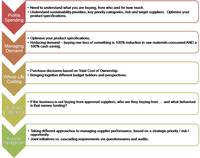Sustainable procurement and the global impact that it has on supply chains worldwide was one of the primary themes at the recent IPSA / CIPS Pan African Conference that was held on May 20 – 21, 2008 at Emperors Palace in Johannesburg. The Conference, entitled “Procurement in the Global Marketplace – Opportunities and Challenges”, was attended by more than 370 delegates from 12 countries. One of the esteemed keynote speakers was Professor Bola Afolabi (CIPS Vice President – UK) on the topic of “Envisioning revolutionary supply chain as an enabler of the prototypical organisation in a new millennium”.
The answer to the question of what sustainable procurement is proved quite simple as there is no single definition for this concept. The reason for this is that sustainability is a contested topic and thus applications and opinions vary across organisations. However, Prof. Afolabi’s presentation at the Conference proved to be a good start to defining and understanding this important and increasingly topical issue.
“Sustainable procurement is a process whereby organisations meet their needs for goods & services…
- in a way that achieves value for money,
- on a whole-life cost cycle basis,
- in terms of generating benefits not only to the organisation,
- but also to society and the economy,
- whilst minimising damage to the environment”.
It is generally understood that the paradigm of sustainability has three main elements, namely: Environmental, Social and Economic. Within each of these elements there are, in turn, issues to be addressed. They can be visually illustrated as follows:

In the above figure it is clearly illustrated that this contested subject is littered with jargon such as “triple bottom line”, “green procurement”, and “carbon footprint”, all of which are capturing the interest of both the investment community and the consumer. Because of this, sustainable procurement must even more so consider the environmental, social and economic consequences of processes like…
- design;
- non-renewable material use;
- manufacture & production methods;
- logistics & service delivery;
- use, operation, maintenance, reuse; and
- recycling options, disposal.
The next important consideration would be the suppliers’ capabilities to address these consequences throughout the supply chain as a whole.
Sustainable Procurement in the World
Prof Afolabi’s presentation was primarily aimed at lifting the profile of the topic at hand with the audience. From the conference proceedings it was quite clear that the topic is a relatively new concept to the African procurement community and thus a rather difficult one to grasp in its entirety. What also became clear was that sustainability is still in its infancy in our region with the private sector a little ahead of the public and government organisations where progress is generally slow.
Conversely, the developed world has already adopted this concept in recent times although it has been around for decades. In the UK, the emphasis within sustainable procurement is on buying from small and local companies, whilst in Europe it is relatively strongly associated with environmental aspects. Moving further West to the US, there is a strong tendency towards purchasing from minority-owned businesses.
The recent trends towards low-cost country sourcing from India and China have in itself brought the issue even more to the fore, and therefore some main areas of concern are:
Environmental factors:
- Use of recycled components where possible.
- Move towards products with less of an environmental impact associated with their extraction, manufacture and/or transportation.
- Can items be composted, recycled, recovered or disposed of sensitively?
Social factors:
- Child labour.
- Forced, prison or bonded labour.
- Decent working conditions, wages and working hours.
- Development opportunities for supplier staff.
Economic factors:
- Do products ensure local employment – what does local mean to us?
- Is there fair trade compliance?
- Legal constraints to consider with local suppliers.
- Use of SMEs, minority businesses, the “third sector”, social enterprises and voluntary organisations.
What about progress?
Some companies have adopted strategies and policies to address sustainable procurement but it is yet to be seen whether their initiatives are more than self-serving public relations exercises. However, some companies, notably E.ON, HSBC, Citigroup and Walmart are leading the pack by having made their intentions clear.
“This topic should be on the mainstream agenda of both private and public sector organisations” says Prof Afolabi in his role as the Vice President of CIPS. “It is positioned at the heart of the CIPS corporate plan for 2007 – 2010. Sustainable procurement is a means of generating value for money and gaining efficiencies between supplier and buyers.”
How can I make a difference?
In an ideal world, every organisation will have an executive management strategy and sustainability clauses in their supplier contracts. However, until we get there, here is a process that can get procurement involved straight away.

SmartProcurement suggests the following three things that can be done in the interim by the procurement function until an ideal situation can be achieved:
- Buy recycled or recyclable products.
- Buy products that consume less energy or other natural resources.
- Implement a method to reduce waste through customer returns.
Some closing words of wisdom from the Conference
“Check your carbon footprint, reject those goods and services produced by child labour even though it is cheaper. Encourage ethical business principles and promote fair trading ideology.
Because every establishment spends a significant proportion of their money on goods & services, the supply chain practitioners are a great conduit to determining how much better a society can be.
We in Africa have lessons to learn from the West in terms of ethical business practice and good governance. Although the journey may be long, we are sure it is not insurmountable. Collectively we can achieve.”
Article submitted by Carine Snyman of SmartProcurement and Elaine Porteous, a contributor and commentator on procurement issues.
Prof Bola Afolabi works for the Nigerian National Petroleum Corporation as General Manager and Project Director leading the implementation of its SAP business solution across its eleven subsidiaries. Before joining NNPC, Prof Afolabi was a Senior Adviser – Supply Chain Management with Shell Manufacturing Services, an arm of the consultancy unit in Shell Global Solutions, the Ne
therlands.
Prof Afolabi is a devoted supply chain professional of 23 years cognate experience, encompassing transportation, warehousing, maritime, strategic sourcing and contracting, in addition to continuous development through academic research and teaching. He has been a member of CIPS since 1993, and was elected into its governing council in October 2003 as pioneer Councilor representing Africa. A Fellow of the institute, current member of Council and its Board of Management. Prof Afolabi became the institute’s Vice President, effective 1st November 2007; thus emerging as the first non-European to occupy this position.


























